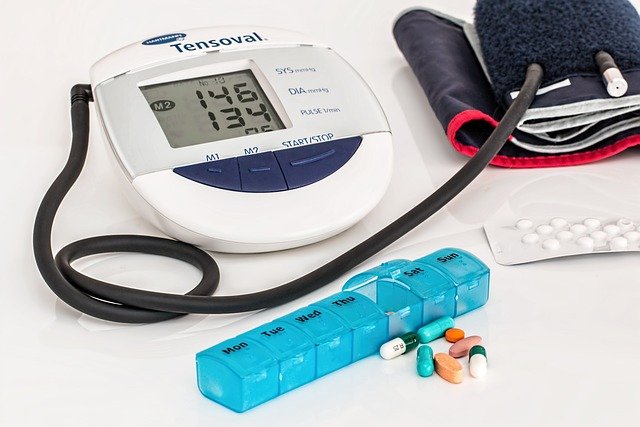7 Ways Home Health Services Promote Independence
In today’s fast-paced world, maintaining independence is a cornerstone of a fulfilling life, especially as we age or face health challenges. Home health services have emerged as a pivotal solution, providing tailored healthcare support that empowers individuals to live life on their own terms. These services are designed and planned to cater to various needs, from managing chronic illnesses to recovery from surgery, all while ensuring that patients remain in the comfort and familiarity of their own homes or offices. Beyond the medical benefits, home health services offer a sense of freedom and dignity that is often compromised in traditional healthcare settings. By leveraging the expertise of healthcare professionals who bring medical assistance directly to the patient’s doorstep, someone can enjoy a higher quality of living life without the added deep stress of frequent hospital visits. Whether it’s through personalized care plans, medication management, or physical therapy, home health services are integral in helping individuals maintain their autonomy, all while receiving the essential care they need. This approach not only fosters a greater sense of independence but also enhances the overall well-being of those who wish to continue living life on their terms.
Home Health Services – Introduction
Home health services offer numerous advantages that support both physical health and emotional well-being. First and foremost, they enable patients to receive necessary or first-aid medical care in the comfort of their own homes, which can significantly enhance their recovery experience by reducing the inner stress and discomfort often associated with hospital stays. This familiar environment can contribute to faster healing and improved mental health by allowing individuals to maintain their daily busy life routines and stay connected with loved ones. Moreover, home health services provide personalized care tailored to each individual’s unique needs, promoting more effective management of chronic conditions and overcoming the likelihood of hospital readmissions. Furthermore, the availability of such services ensures that individuals have access to professional medical advice and care without the need to travel, which is particularly valuable for those with mobility and advanced challenges or limited transportation options. Overall, home health services play a critical role in empowering individuals to lead healthier, more independent lives.
What Are Home Health Services?
Home healthcare services encompass a broad range of healthcare support delivered by licensed professionals, including:
Skilled Nursing Care:
Nurses provide clinical support, such as administering medications, wound care, and managing medical equipment (like catheters or feeding tubes).
Physical, Occupational, and Speech Therapy:
Therapists work with patients on rehabilitation goals, such as improving mobility, rebuilding strength, and regaining communication or swallowing skills.
Personal Care Assistance:
Home health aides assist with bathing, grooming, dressing, and other daily personal care tasks, ensuring the individual’s comfort and dignity.
Medical Social Services:
Social workers help connect patients with community resources, coordinate care, and provide counseling to address any emotional or social concerns related to their health.
Medication Management:
Professionals monitor medication schedules, educate patients about prescriptions, and ensure compliance to prevent health complications.
Who Can Benefit from Home Health Services?
Seniors Needing Assistance:
Older adults may benefit greatly from home health services, especially if they require help with daily tasks or ongoing medical care to maintain their independence and quality of life.
Patients Recovering from Surgeries or Injuries:
Individuals who have recently undergone surgery, been hospitalized, or sustained injuries can take advantage of home health services to ensure a smoother and more comfortable or transparent transition back to everyday activities.
Individuals Managing Chronic Illnesses:
Those living with chronic conditions such as diabetes, heart disease, joint pain, or chronic obstructive pulmonary disease (COPD) can receive regular monitoring, guidance, and care to help manage their health effectively.
People with Disabilities:
Home health services provide essential support for individuals with disabilities who may need assistance with mobility, personal care, or managing health-related needs.
Individuals Requiring Palliative or End-of-Life Care:
For those needing palliative care or end-of-life services, home health care offers the comfort and dignity of receiving compassionate support in the familiar setting of their own home.
Benefits of Home Health Services for Independent Living
1. Access to Reliable Healthcare at Home
Home health services provide seniors with direct access to reliable healthcare without leaving the comfort of their homes. This service model eliminates the need for frequent travel to clinics or hospitals, thus reducing stress and enhancing convenience for older adults. From routine check-ups to specialized care, healthcare professionals visit seniors to offer personalized medical attention tailored to their specific needs. These professionals include nurses, therapists, and aides who are trained to handle various medical situations seamlessly within the home environment.
According to a published article in the Journal of the American Geriatrics Society, seniors who receive in-home healthcare experience fewer hospital visits and improved overall health outcomes. This is primarily because regular in-home visits allow for early detection of potential health problems, effective management of chronic conditions, and timely interventions, which altogether contribute to better health maintenance. Moreover, home health services empower seniors by providing education on self-care practices, thus enabling them to take an active and advanced role in managing their health.
By facilitating access to healthcare services, home healthcare minimizes the risks associated with delayed or missed medical appointments, which are common barriers to care for those with mobility or transportation challenges. In the home setting, healthcare providers can deliver care that is not only convenient but also thorough, taking into consideration the unique living circumstances and preferences of the individual. This personalized and planned approach to care can lead to stronger patient-provider relationships, encouraging open communication and a better understanding of health expectations and goals.
As a proactive measure, home health services often include regular health assessments, which play a critical role in proactively managing any potential health issues seniors might face. Encouraging these assessments supports early intervention strategies that can prevent minor health concerns from evolving into serious conditions. By providing seniors with the tools and information needed to maintain their health independently, these services help preserve their autonomy and quality of life.
Home health services offer an invaluable resource for seniors wishing to age comfortably and independently at home. By delivering healthcare directly to the doorstep, these services ensure continuity of care, boost patient morale and promote a healthier living environment. With the right support, seniors can confidently navigate their healthcare journeys, enjoying the peace and familiarity of their own homes or offices while receiving the comprehensive care they deserve.
2. Tailored Care Plans for Personal Independence
A one-size-fits-all approach doesn’t work in healthcare, and this is where tailored care plans come into play. Home health services design individualized care plans that address the unique needs of each senior. By focusing on their specific health conditions, preferences, and goals, these plans empower seniors to manage their health effectively.
For example, consider a senior with mobility issues: their care plan might include prescribed physical therapy exercises to improve strength and balance, thereby aiding their ability to perform daily tasks independently. This personalized approach not only alleviates the strain on mobility but also fosters confidence and autonomy. Additionally, the care plan can incorporate adaptive equipment recommendations, nutritional advice for bone health, and scheduled home safety assessments to prevent falls.
Each tailored care plan is developed in close collaboration with the senior and their other family members, ensuring that all aspects of the individual’s lifestyle and medical history are considered. Healthcare professionals such as physical therapists, occupational therapists, Doctors and nutritionists work together to create a comprehensive plan that addresses the senior’s holistic needs. Regular reviews and modifications to the care plan ensure its continued effectiveness, adapting to any changes in health status or personal goals. In doing so, tailored care plans serve as a cornerstone for promoting self-sufficiency and enhancing the quality of life for seniors, allowing them to age gracefully in their familiar surroundings.
3. Support with Daily Activities to Promote Autonomy
Daily activities such as bathing, eating, dressing, and grooming can become challenging for some seniors. Home health aides play a crucial role in assisting with these tasks, all while encouraging seniors to participate to the greatest extent possible, thus fostering a sense of autonomy. Encouraging seniors to engage actively in their daily routines not only aids in maintaining their dignity but also supports and engages their physical and emotional well-being. For example, aides might guide seniors through bathing routines by offering gentle support and supervision, allowing them to carry out tasks independently whenever feasible. This partnership approach enables aides to provide help without completely taking over, cultivating a supportive environment where seniors feel in control.
A survey by AARP found that 87% of seniors wish to age in place, underscoring the importance of facilitating their daily routines at home. To further support this desire, adaptive equipment can be introduced as a part of the home. Simple additions such as grab bars in bathrooms, shower chairs, or specially designed dressing aids can significantly enhance both safety and independence, reducing the risk of accidents while allowing seniors to manage their daily activities with greater ease. The implementation of these tools, alongside personalized assistance from aides, ensures a practical and respectful support system, emphasizing the senior’s desire for a self-reliant life in the comfort of their home environment.
4. Medication Management for Seniors Living Independently
Proper medication management is crucial for seniors, especially those with multiple prescriptions. Home health services include medication management to ensure seniors take their medications correctly and on time, reducing and overcoming the risk of adverse drug interactions and hospitalizations. Effective medication management involves several aspects, such as creating a detailed medication schedule, utilizing pill organizers, and setting reminders. Caregivers and home health aides may also assist in educating seniors and their families about potential side effects and the importance of adhering to prescribed dosages. Effective communication with healthcare providers is essential to keep the medication regimen updated and to make necessary adjustments promptly.
Here, we discuss six logical points to establish an effective medication management system:
- Creating a Detailed Medication Schedule: Developing a comprehensive medication schedule tailored to each senior’s needs is vital. This schedule should include the name of each medication, dosage, frequency, and specific instructions (e.g., take with food). Clear schedules help seniors understand their regimens, promoting adherence and reducing confusion.
- Utilizing Pill Organizers and Technology: Pill organizers are practical tools for managing daily medication intake by sorting pills into compartments labeled for specific times or days. Combining these with digital reminders via smartphone apps or alarm clocks can provide additional prompts, helping seniors remember when to take their medications accurately.
- Educating Seniors and Families: Education is fundamental in medication management. Home health aides should inform seniors and their families about the intended effects, possible side effects, and the risks of non-adherence. Empowering seniors through education fosters greater respect for their medication regimen, encouraging them to follow prescribed instructions diligently.
- Effective Communication with Healthcare Providers: Constant communication with doctors and pharmacists is necessary for up-to-date medication management. Open dialogues can address concerns, review dosages, and incorporate new treatments as medical conditions evolve. Seniors and their aides should be encouraged to maintain a list of medications to streamline discussions with healthcare providers.
- Implementing a Monitoring System: Regularly monitoring a senior’s response to medications ensures the treatment plan remains effective and safe. Monitoring involves tracking health outcomes, side effects, or changes in condition. Home health aides can assist by maintaining records, observing any physical or behavioral changes, and reporting significant issues to healthcare professionals promptly.
- Ensuring Regular Reviews of Medication Efficacy: Periodic medication reviews help ascertain ongoing therapeutic effectiveness and adjust therapies as required. These reviews should be scheduled regularly to align with health check-ups, allowing for timely modifications and preventing unnecessary or redundant medication use.
A study by the National Institutes of Health highlights that proper medication management can decrease medication errors by up to 50%, significantly enhancing a senior’s ability to live independently. Adopting a strategic and systematic approach to medication management assures seniors of safe, informed, and effective use of medications, greatly contributing to their self-reliance and overall well-being.
5. Nutritional Support and Meal Preparation
Nutrition is a key and foremost factor in maintaining health and independence for seniors, directly impacting their energy levels, physical health, and overall well-being. Proper nutritional support and meal preparation are integral components of home health services, specifically designed to accommodate the unique dietary requirements of older adults. Home health services prioritize delivering balanced meals that fulfill seniors’ nutritional needs, ensuring they receive essential vitamins, minerals, and macronutrients necessary for optimal health.
Customizing meal plans to align with specific dietary constraints, such as low-sodium or diabetic-friendly options, is crucial in preventing chronic illnesses and managing existing health conditions. A vital aspect of providing nutritional support is understanding and respecting the seniors’ personal food preferences and dietary restrictions. Including seniors in the meal planning process not only honors their autonomy and cultural traditions but also encourages them to engage more actively in their health management, fostering a sense of control over their dietary choices.
Meal preparation services extend beyond just delivering meals; they often involve shopping for fresh ingredients, cooking balanced dishes, and ensuring portion sizes are appropriate for individual needs. Moreover, caregivers and aides are trained to prepare meals that are not only nutritionally complete but also appealing and enjoyable, which is important for stimulating appetite, especially in seniors who may experience a decreased interest in food.
Regularly consulting with nutritionists or dietitians is advisable to keep dietary plans aligned with the seniors’ evolving health requirements. These professionals can provide invaluable guidance on meal composition, recommend appropriate meal substitutions, and address any dietary concerns that may arise. In addition to meal preparation, home health services often provide resources and education about healthy eating habits, enhancing both the seniors and their family’s understanding of nutritional importance.
6. Social Engagement and Activities for Mental Health
Social isolation is a major concern for seniors, as it significantly impacts their mental health and independence. Home health services and visits play a crucial role in combating this issue by encouraging social engagement through various activities and community involvement. Regular social interaction is beneficial as it improves cognitive function and reduces the risk of high depression.
One effective method of fostering social connections is by organizing virtual or in-person group activities. Book clubs are a popular choice, as they encourage discussion and critical thinking. Seniors who participate in book clubs can share their insights, listen to different perspectives, and enjoy the sense of community that comes with group reading. Crafting sessions are another excellent option, allowing seniors to express their creativity while socializing with peers. These activities not only offer mental stimulation but also foster a sense of belonging and accomplishment.
Moreover, community involvement through volunteering opportunities or local events can provide seniors with a purpose and sense of contribution, enhancing their overall well-being. These interactions can build supportive networks that promote emotional resilience and a positive outlook on life. Ultimately, maintaining an active social life is essential for seniors’ mental health and can vastly improve their quality of life.
7. Busy life and home health services
Modern society is fast-paced, with many adults juggling work, family responsibilities, and personal commitments. This busy lifestyle can make it challenging to provide adequate care for aging loved ones. In such cases, home health services offer a convenient solution by providing professional care in the comfort of one’s own home.
By utilizing these services, working adults can ensure that their elderly parents or relatives receive the necessary support and assistance while they carry out their daily activities. Home health aides can help and engage with household tasks, meal preparation, medication time schedule management, and personal care, allowing seniors to maintain their independence and dignity without burdening their families. Furthermore, home health services offer flexibility in scheduling appointments and services, making it easier to cater to different needs and preferences. This flexibility is especially beneficial for senior citizens who may require frequent medical check-ups or have complex health conditions that require specialized care.
Overall, the availability of home health services allows seniors to age in place comfortably, moraly and safely while also providing peace of mind for their families. It enables them to continue living a fulfilling life while receiving the necessary care and support they need. So, in today’s fast-paced society, home health services play a vital role in supporting both seniors and their busy caregivers. As technology continues to advance, there are also innovative solutions and plans such as telehealth and remote monitoring that can provide additional support for aging individuals at home. These technologies allow seniors to receive virtual medical care and monitoring, reducing the need for frequent hospital visits.
Moreover, home health services also offer companionship and social interaction for seniors, which can greatly improve their mental well-being. Many elderly people may feel isolated or lonely due to physical limitations or the loss of a spouse or friends. Having a caregiver who can provide emotional support and engage in activities with them can greatly enhance their quality of life.
Conclusion
Home health services play an effective role in promoting independence among seniors. By delivering personalized healthcare, assisting with daily activities, managing medications, and encouraging social engagement, these services empower seniors to live healthier, more autonomous lives. If you’re a healthcare professional or caregiver, consider integrating these home health services into your care plans to enhance the independence and well-being of the seniors you support. Explore how our tailored home health programs can be part of your solution today.






